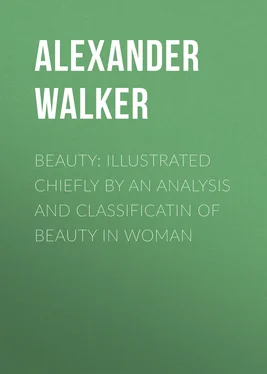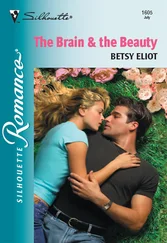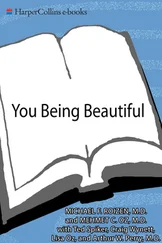Alexander Walker - Beauty - Illustrated Chiefly by an Analysis and Classificatin of Beauty in Woman
Здесь есть возможность читать онлайн «Alexander Walker - Beauty - Illustrated Chiefly by an Analysis and Classificatin of Beauty in Woman» — ознакомительный отрывок электронной книги совершенно бесплатно, а после прочтения отрывка купить полную версию. В некоторых случаях можно слушать аудио, скачать через торрент в формате fb2 и присутствует краткое содержание. Жанр: foreign_antique, foreign_home, psy_sex_and_family, на английском языке. Описание произведения, (предисловие) а так же отзывы посетителей доступны на портале библиотеки ЛибКат.
- Название:Beauty: Illustrated Chiefly by an Analysis and Classificatin of Beauty in Woman
- Автор:
- Жанр:
- Год:неизвестен
- ISBN:нет данных
- Рейтинг книги:5 / 5. Голосов: 1
-
Избранное:Добавить в избранное
- Отзывы:
-
Ваша оценка:
- 100
- 1
- 2
- 3
- 4
- 5
Beauty: Illustrated Chiefly by an Analysis and Classificatin of Beauty in Woman: краткое содержание, описание и аннотация
Предлагаем к чтению аннотацию, описание, краткое содержание или предисловие (зависит от того, что написал сам автор книги «Beauty: Illustrated Chiefly by an Analysis and Classificatin of Beauty in Woman»). Если вы не нашли необходимую информацию о книге — напишите в комментариях, мы постараемся отыскать её.
Beauty: Illustrated Chiefly by an Analysis and Classificatin of Beauty in Woman — читать онлайн ознакомительный отрывок
Ниже представлен текст книги, разбитый по страницам. Система сохранения места последней прочитанной страницы, позволяет с удобством читать онлайн бесплатно книгу «Beauty: Illustrated Chiefly by an Analysis and Classificatin of Beauty in Woman», без необходимости каждый раз заново искать на чём Вы остановились. Поставьте закладку, и сможете в любой момент перейти на страницу, на которой закончили чтение.
Интервал:
Закладка:
We are settled in our conviction that there is something in Personal Beauty, of a representative and correspondent character. It represents a spiritual beauty—corresponds with a moral symmetry. Though we call it an outward property, still it must be a picture of the internal . It would seem impossible that there can be a speaking expression of grace and loveliness, upon a face that is but a telegraph of an inward deformity and ugliness. Perhaps all this may seem somewhat ideal in its philosophy—and, perhaps, almost transcendental. But we hold it to be true. It certainly appears to us reasonable that the minor should reflect the reality, as well in this heaven-made humanity, as amid the earthy art of our drawing-rooms. That the spirit should speak out in the language of the countenance, is to us as excellent sense as that it should tell its story in protuberances and indentations. Who can deny this—and where will the argument fail? We pause for a reply.
Let us be understood, however. We have no idea of going beyond reason in a theory, which, though it may appear more than plausible to us, may seem far this side of plausible to others. Yet we think we are borne out by example. We do not maintain, it will be remembered, that beauty of person must necessarily be the representative of moral beauty , according to the best and highest definition of that term. That definition, we presume, would include the virtuous and the heavenly. That these traits are unfailing accompaniments of noble features—the beautiful countenance—the finished form—it would be hazardous and foolish to assert. What we intend to say is this—that we believe external beauty is the representation of an internal and spiritual quality of the same nature. That Beauty may be spiritual, though it may not be moral—the Beauty of Virtue. It may be the beauty of superior and surpassing powers—the Beauty of Genius. It may be the beauty of a mind, uncommon in its attractions, and in its proportions beyond fault or question. It may be the beauty of intellectual symmetry—and this may find its speaking resemblance in the chiseled face and figure, as certainly as the moral loveliness of the heaven-inspired—the emphatically good man. Of what more perfect mental proportions could the human countenance have been indicative, than the countenance of Napoleon? The symmetry of Genius spake there, if it was true—as it certainly was—that moral beauty had no telegraph in that splendid sculpture of the man.
But we have said as much as we can afford to—though the more particular subject of our remarks—or what in good faith should have been, if it has not—Beauty in Woman, would seem to be one on which it would not be deemed unknightly to give way to a pretty expression. We must, however, leave all considerations of gallantry on this score, to others who can amplify better than we can, when we have got to the end of our chapter.
ADVERTISEMENT
There is perhaps no subject more universally or more deeply interesting than that which is the chief subject of the present work. Yet no book, even pretending to science or accuracy, has hitherto appeared upon it. The forms and proportions of animals—as of the horse and the dog—have been examined in a hundred volumes: not one has been devoted to woman, on whose physical and moral qualities the happiness of individuals, and the perpetual improvement of the human race, are dependant.
The cause of this has been, probably, the neglect on the part of individuals, to combine anatomical and physiological knowledge with the critical observation of the external forms of woman; and, perhaps, some repugnance to anthropological knowledge on the part of the public. The last obstacle, if ever it existed, is now gone by, as many circumstances show; and it will be the business of the author, in this work, to endeavor to obviate the former.
The present work, beside giving new views of the theory of beauty, and of its application to the arts, presents an analysis and classification of beauty in woman. A subsequent work will apply the principles here established to intermarriages and crossings among mankind, and will explain their results in relation to the happiness of individuals, and to the beauty and the freedom from insanity of their offspring. A final work will examine the relations of woman in society, will expose the extravagant hypothesis of writers on this subject who have been ignorant of anthropology, and will describe the reforms which the common interests of mankind demand in this respect.
It is now to be seen, whether a branch of science which is strictly founded on anatomy and physiology—one which entangles the reader in no mystical and delusive hypothesis, and presents to him only indisputable facts—one which is applicable to the subject most universally and deeply interesting to mankind, the critical judgment of female beauty, as founded on necessary functions—and one which unravels the greater difficulties which that subject presents—may not excite and permanently command a great degree of public interest.
A preliminary view of the importance of this subject is given in the first chapter; the urgency of its discussion, in relation to the interests of decency and morality, is established in the second; and some useful cautions as to youth are offered in the third.
In regard to the importance of the subject, I may, even here, avail myself of the highest authorities.
Thomas More, speaking of the people of his commonwealth, says: “They do greatly wonder at the folly of all other nations, which, in buying a colt (whereas, a little money is in hazard), be so chary and circumspect, that, though he be almost all bare, yet they will not buy him, unless the saddle and all the harness be taken off—lest, under those coverings, be hid some gall or sore. And yet, in choosing a wife , which shall be either pleasure or displeasure to them all their life after, they be so reckless, that, all the residue of the woman’s body being covered with clothes, they esteem her scarcely by one hand-breadth (for they can see no more but her face), and so to join her to them, not without great jeopardy of evil agreeing together—if anything in her body afterward should chance to offend and mislike them.” 1 1 Utopia, Book II., chap. viii.
Francis Bacon is of similar opinion.
Happily, the advancement of anthropological science in modern times, may, as is here shown, be so applied as to render quite unnecessary the objectionable methods proposed by both these philosophers, in order to carry their doctrines into practice.
Shall I be blamed, because I avail myself of the progress of knowledge to render all that these great men desired on this subject of easy attainment and inoffensive to woman? Shall I be blamed, because I first facilitate that which the still farther advancement of knowledge will inevitably render an everyday occurrence, and the guide of the most important act of human life? —I care not.
In the details as to female beauty, it will be seen how incorrectly Winckelmann says: “In female figures, the forms of beauty are not so different, nor the gradations so various, as in those of males; and therefore in general they present no other difference than that which is dependant upon age.... Hence, in treating of female beauty, few observations occur as necessary to be made, and the study of the artist is more limited and more easy.... It is to be observed, that, in speaking of the resemblance of nude female figures, I speak solely of the body, without concluding from it that they also resemble each other in the distinctive characters of the head, which are particularly marked in each, whether goddess or heroine.”—The differences, even in the bodies of females, are here shown to be both numerous and capable of distinct classification.
Читать дальшеИнтервал:
Закладка:
Похожие книги на «Beauty: Illustrated Chiefly by an Analysis and Classificatin of Beauty in Woman»
Представляем Вашему вниманию похожие книги на «Beauty: Illustrated Chiefly by an Analysis and Classificatin of Beauty in Woman» списком для выбора. Мы отобрали схожую по названию и смыслу литературу в надежде предоставить читателям больше вариантов отыскать новые, интересные, ещё непрочитанные произведения.
Обсуждение, отзывы о книге «Beauty: Illustrated Chiefly by an Analysis and Classificatin of Beauty in Woman» и просто собственные мнения читателей. Оставьте ваши комментарии, напишите, что Вы думаете о произведении, его смысле или главных героях. Укажите что конкретно понравилось, а что нет, и почему Вы так считаете.












